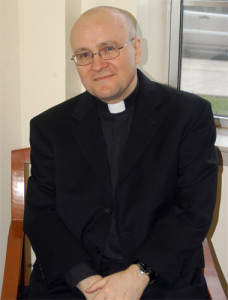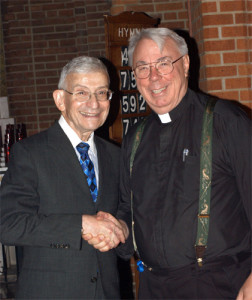by Marie Elena Giossi
Fifty years after Pope Paul VI formed a Vatican office dedicated to interreligious relations, much has been accomplished among people of good will, and more efforts are needed to foster understanding, respect and peace in the world.
Originally known as the Secretariat for Non-Christians, the office was renamed the Pontifical Council for Interreligious Dialogue (PCID) in 1988 by Pope John Paul II.
It is the Church’s central office for the promotion of interreligious dialogue.

Pope Francis recently reappointed Brooklyn priest Father James Massa to another five-year term as one of the PCID’s 50 consultors, or advisors who assist the office with research, information and suggestions. He also serves as moderator of the diocesan curia and vicar for evangelization.
He previously sat as executive director of the USCCB’s Secretariat for Ecumenical and Interreligious Affairs, 2002-2011, coordinating national dialogues between Catholic leaders and their counterparts in other religious traditions.
Interreligious dialogue, Father Massa explained, is an ongoing conversation between the Catholic Church and non-Christians, who either profess a belief in a religious tradition outside of Christianity or profess no belief at all.
The purpose, he said, “is to grow in mutual understanding and to give common witness to peace.
Dialogue with ‘The Other’
“It’s all within the spirit of the Second Vatican Council to enter into dialogue with ‘the other,’ whomever the other might be,” he said.
However, unlike ecumenism, which seeks to restore unity and full communion among all Christians, Father Massa said the goal of interreligious dialogue “is not to bring about unity because that would mean the non-Christian would become Christian.”
Rather, the aim is to develop a mutual acceptance and respect for each other’s differences through encounters in daily life and activities, which can lead to a sharing of religious traditions and an appreciation of each other’s spiritual values.
“We never give up on our responsibility as Christians to give witness to Jesus Christ,” Father Massa affirmed. “On the other hand, we want to enter into respectful dialogue with the other and recognize elements of truth and holiness that are present outside of the Christian community.
“However one appropriates knowledge of Christ, of Jesus, it is the responsibility of the Catholic Christian to bear witness to Him and to make Him known and loved.”
That mission of bearing witness has claimed the lives of countless Christians from the early church in Rome to the present times.
“Today, the violence is not so much between Christian communities but … exists by way of persecutions of Christians by Islamist militants, Boko Haram in Nigeria, by Hindu nationalists in India,” he said. “The violence continues, and it will take many efforts at dialogue before the wounds … will be healed.”
Still, over the last five decades, Father Massa believes good progress has been made in ecumenical dialogue through meetings between the Catholic Church and heads of Orthodox, Protestant and Evangelical churches. One great step forward was the attendance of Greek Orthodox Patriarch Bartholomew I of Constantinople at Pope Francis’ papal inauguration in March, 2013. His presence “would have been unthinkable 100 years ago,” Father Massa said.
He pointed out that Christian religious scholars have also reached theological agreements on previously church-dividing issues of doctrine, most notably, the Lutheran World Federation and the Catholic Church issued a joint declaration on their common understanding of the doctrine of justification in 1999.

On matters affecting the human family, Christian and non-Christian churches and organizations have joined together to address social crises, moral issues and shared concerns in the public square. Earlier this year, the Brooklyn Diocese collaborated with Orthodox Jewish leaders in an effort to secure education tax credits for Catholic schools and yeshivas.
On the parish level, ecumenism and interreligious relations are growing with prayer services during the Week of Christian Unity, Seder Suppers during Passover and interfaith prayer services at Thanksgiving, like the one that has been going strong at Our Lady of Refuge parish, Flatbush, for over a dozen years. Various faith traditions participate annually.
Father Massa noted that another “wonderful testament to the fruits of ecumenism” in the diocese was observed at the recent funeral of Father Walter Mitchell. Seeing Father Eugene Pappas, a Greek Orthodox priest, sitting among the congregation, Bishop Nicholas DiMarzio invited him to join the other priests in the sanctuary, saying, “You are one of us.”
“Some might say that we’ve gone as far as we can theologically and in terms of cooperation on social issues,” Father Massa added. “But I think the message of the popes from John XXIII to Francis has been consistently that we cannot give up on seeking greater collaboration and long-lasting respect for one another.”
